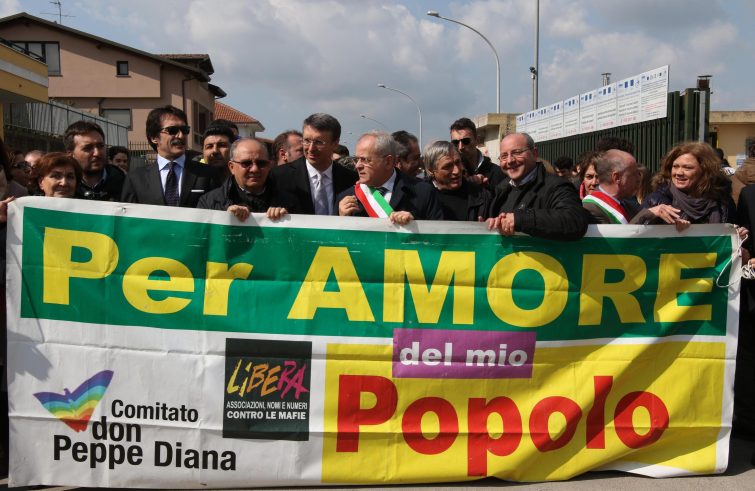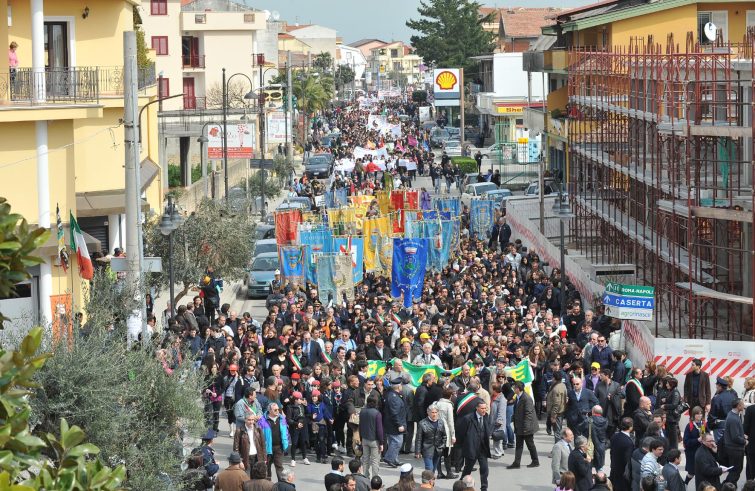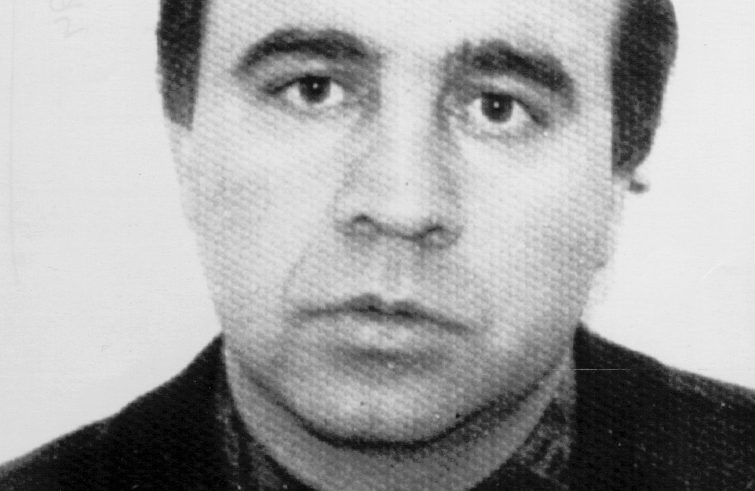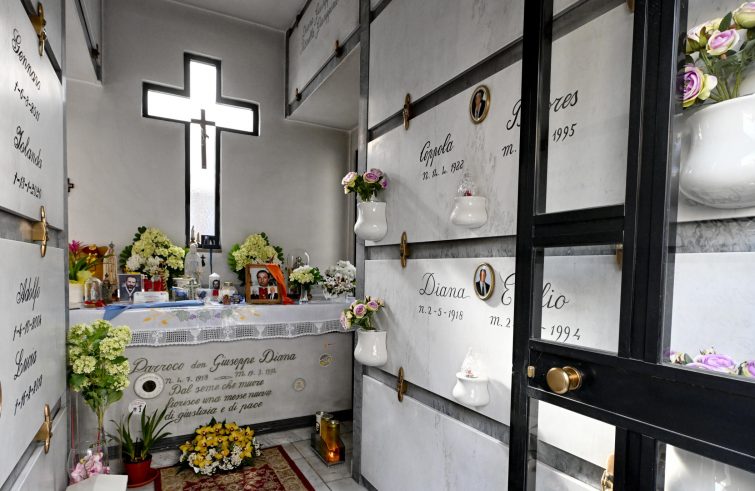
On 19 March 1994, just after 7.20am, Father Peppe Diana, parish priest of the church of St. Nicholas of Bari in Casal di Principe, was preparing to celebrate Mass. Some women and nuns were already inside the church. Waiting for the priest was his friend Augusto di Meo, who was there to wish him well on his name day. As the priest was about to say Mass, a man came in and asked: “Who is Father Peppe?” Father Diana replied: “That’s me”. The man pulled out a gun and shot him. That was how Father Peppe Diana was killed by the Casalesi clan, when he was yet to turn 36. On 21 March 1994, the day of Father Diana’s funeral, Monsignor Antonio Riboldi, Bishop of Acerra, prophesied: “On 19 March a priest died, but a people was born.” In fact, thirty years after that heinous Camorra killing, the ‘territories of the Camorra’ have become the ‘territories of Father Diana’, following in his footsteps. SIR interviewed Salvatore Cuoci, coordinator of the “Don Peppe Diana” Committee, established in 2006, the result of a process that lasted several years and involved individuals and organisations united by the desire to keep alive the memory of the martyrdom of a priest who died for the love of his people.
How has your local community changed since the murder of Father Diana?
A lot has changed, and the changes are self-evident . When the Camorristi killed Father Peppe Diana that morning thirty years ago, they also wanted to kill hope: it was not enough to kill a priest in his church, for them it was also necessary to sow the seeds of defamation, to make sure that nothing would ever grow in these lands, not even hope. Rather, that death was a tipping point, a watershed, a spark that made people realise what was happening. The bloodshed that stained the territory of Casal di Principe bore fruit, which arrived shortly afterwards, little by little, first with the confiscated property, then with the confiscated land, which we turned into farmland, the ‘Pacco alla Camorra’ (Camorra parcel) initiative, with the cultivated produce, then with houses and temporary centres, workshops, a library, seminars, books, films and many other initiatives.
This area underwent tremendous changes. After the successful resistance of the Church, of associations, citizens and part of the public institutions, all that remains today is a yearning for freedom. The crowd that was in the streets and squares on 19 March thirty years ago, and then at Father Peppe’s funeral on 21 March, the first day of spring, has become a people united around one goal: the liberation of these communities.
 To what extent is the Camorra still present in these areas?
To what extent is the Camorra still present in these areas?
We are well aware that the Camorra has not yet been eradicated. The Camorra and the Mafia syndicates have not been defeated, and in some ways they are stronger than before. Today there is no more shooting, but there is a vast amount of virtual, underground finance concealed amidst the legitimate revenues, and there is widespread corruption, so we know that
There is still a long way to go, but there is no going back.
We must remain united, because if we manage to take three steps forward, the mafia syndicates will have to take three steps back. It’s up to us to stand together, be united and, most importantly, to continue along this path.
How do you inform young people about the story of Father Diana?
We visit schools to bring words of life, with the pupils we address the situation with new words, words of hope, to make young people understand that they can regain control of their lives, their dreams, their hopes.
We speak openly to the children. We encourage them to dream, but also to have questions, to be as restless as Father Peppe was, and to value beauty, freshness and joy.
Today, 19 March, we are going to paint the streets of Casal di Principe with the many colours of young people. Four young people are doing community service in our social promotion centre ‘Casa don Diana’, while others come here as an alternative to imprisonment, and we are in contact with a number of school classes who visit Casa don Diana in Casal di Principe to learn about the situation first hand, to see it for themselves. This approach promotes the creation of bridges of communication, fostering relationships, caring for people, being close to young people, dreaming with them: this is our approach.
 As someone who knew Father Diana, could you tell us something about him?
As someone who knew Father Diana, could you tell us something about him?
I was one of the Catholic Action boys who distributed the document “For the Love of My People” in front of parish churches in 1991.
Father Peppe was an outspoken, strong man who didn’t mince his words,
He would always speak directly to your face, even if he knew that sometimes those words would hurt, that they would touch deep chords within you, but that was his intention: to reach into your conscience, into your ego, because he knew that by putting his hand on your shoulder and speaking softly, he could bring you back to life, to enthusiasm, to the freshness of youth.
I also remember him as a tireless challenger who could not remain silent, a person who knew how to touch people’s hearts and who continues to teach us and show us the way.
Father Peppe has been a prophetic voice…
He has indeed. It was the end of the 1980s and the beginning of the 1990s, when people were dying for a yes or a no, for a misunderstood look, for the wrong look. And in those dark times he was a clear, direct, fresh voice in the pulpit.
Even as secretary to the then Bishop of Aversa, Monsignor Giovanni Gazza, he knew how to make his voice heard, to make his cry heard. This is the Peppe we continue to love and in whom we continue to believe.
Were you aware of the risk that both Father Peppe and yourself, being close to him, were taking at the time?
We weren’t aware of it, but we had some concerns. Father Peppe used to say: “I have the cassock, what can they do to me? I am a priest.” Instead, the Camorra and the Mafia proved that they would not let priests go unpunished, with the murder of Father Puglisi in Sicily and Father Peppe in his church. Nor did they spare children, as in the case of Giuseppe Di Matteo, a 12-year-old boy who was dissolved in acid. In other words, at that time nothing and nobody could stop these people’s savagery. Of course we were afraid, but we never thought that they would break this taboo, and instead they broke it by killing Father Peppe. That’s why I said before that
the Camorra didn’t want to give people hope, and instead that death brought forth rich, strong fruit that we are now harvesting with much love. But we know that there is more fruit to come, and we would like to see its shapes, taste it, imagine its colours. Let us continue in this constant search.
 What can the example of Father Peppe offer society today?
What can the example of Father Peppe offer society today?
Father Peppe’s message is still very important today. If he were here, he would renew his call to climb the rooftops to proclaim words of life, to proclaim our dissatisfaction with this society and our desire for freedom, our way of being.
In fact, it is not enough to shout: we must also act, walk, take our lives by the hand and make a masterpiece of them, we must be able to rise above, to have a far-sighted vision, to aim at the horizons. This is what Don Peppe would continue to tell us, and today he continues to walk beside us.
You mentioned Father Puglisi, are you hoping for the beatification also of Father Peppe in the future?
In 2015 we submitted a request for beatification to the Diocese of Aversa, with a letter signed by the Commission, by the witness Augusto, by the family and by other priests. There is now a commission collecting testimonies, books and writings. Perhaps the time is not yet ripe for Peppe’s beatification. However, in due time, Father Diana will be beatified, we are sure, but it is an internal process of the Church, we can only encourage it. However
We must be careful not to be carried away by the idea of wrapping the figure of Father Peppe in cotton wool, placing him in a shrine where to pray for him and that’s it. That Peppe belongs to us: the restless, rebellious Peppe who continues to speak to us, who continues to put his hand on our shoulder, who continues to challenge us and also to reproach us. That Peppe belongs to us, the Peppe with whom we want to continue dreaming of paths of freedom, of brighter and purer horizons, of better societies, alternatives to the Camorra and the Mafia, where people are the social capital and the richness of a given region.












